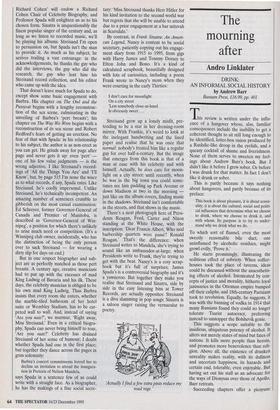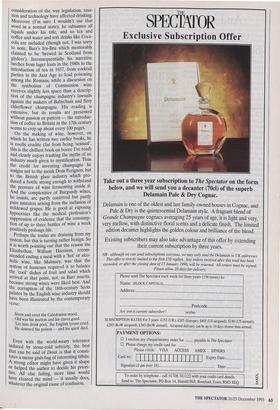The mourning after
Andro Linklater
DRINK: AN INFORMAL SOCIAL HISTORY by Andrew Barr Bantam Press, £16.99, pp. 401 his review is written under the influ- ence of a hangover whose, alas, familiar consequences include the inability to get a coherent thought to sit still long enough to be identified, letter-box vision produced by a Rushdie-like droop in the eyelids, and a queasy cocktail of shame and liverishness. None of them serves to sweeten my feel- ings about Andrew Barr's book. But I didn't like it before I grew sober. Or before I was drunk for that matter. In fact I don't like it drunk or sober.
This is partly because it says nothing about hangovers, and partly because of its preface:
This book is about pleasure, it is about sensu- ality; it is about the cultural, social and politi- cal influences that determine what we choose to drink, where we choose to drink it, and with whom. Its purpose is to try to under- stand why we drink what we do.
To which sort of flannel, even the most sweetly reasonable bile duct, one uninflamed by alcoholic residues, might growl evilly, 'Prove it.'
He starts promisingly, illustrating the seditious effect of sobriety. When coffee- houses took the place of taverns, ideas could be discussed without the anaesthetis- ing effects of alcohol. Intoxicated by con- cepts of justice and morality, hitherto loyal janissaries in the Ottoman empire bumped off their caliphs, and 18th-century Parisians took to revolution. Equally, he suggests, it was with the banning of vodka in 1914 that many Russians found they could no longer tolerate Tsarist autocracy, preferring instead to unstopper the Bolshevik genie.
This suggests a scope suitable to the insidious, ubiquitous potency of alcohol. It alters not merely states of mind but fates of nations. It kills more people than heroin, and promotes more benevolence than reli- gion. Above all, the existence of drunken unreality makes reality, with its dullness and uncertain happiness, its hazards and certain end, tolerable, even enjoyable. But having set out his stall as an advocate for the ways of Dionysus over those of Apollo, Barr retreats.
Succeeding chapters offer a picayune Consideration of the way legislation, taxa- tion and technology have affected drinking. Moreover (I'm sure I wouldn't use that word in a normal state), he subsumes all liquids under his title, and so tea and coffee and water and soft drinks like Coca- cola are included (though not, I was sorry to note, Barr's Irn-Bru which memorably claimed to be 'brewed in Scotland from girders'). Inconsequentially his narrative lurches from lager louts in the 1980s to the introduction of tea in 1657, from cocktail parties in the Jazz Age to lead poisoning among the Romans, while a discursion on the symbolism of Communion wine receives slightly less space than a descrip- tion of the champagne industry's lawsuits against the makers of Babycham and fizzy elderflower champagne. His reading is extensive, but its results are presented without passion or pattern — the introduc- tion of coffee to Britain in the 17th century seems to crop up about every 100 pages. On the making of wine, however, on which he has 'written two earlier books, he is coolly erudite (far from being 'sensual', this is the chilliest book on booze I've read) and clearly enjoys trashing the myths of an industry much given to mystification. Thus the credit for inventing champagne he assigns not to the monk Dom Perignon, but to the British glass industry which pro- duced a bottle strong enough to withstand the pressure of wine fermenting inside it. And the complexities of Burgundy wines, he insists, are partly contrived but partly pure mistakes arising from the inclusion of mildewed grapes. He is good at exposing hypocrisies like the medical profession's suppression of evidence that the consump- tion of up to three bottles of wine a week positively prolongs life. Perhaps the toxins are draining from my System, but this is turning rather benign. So it is worth pointing out that the reason the Elizabethan, William Harrison, recom- mended ending a meal with a 'hot' or alco- holic wine, like Malmsey, was that the system of humours required it to balance the 'cool' dishes of fruit and salad which arrived at that point, not, as Barr asserts,
because strong wines were liked best. And the corruption of the 18th-century Scots Palates by the English wine industry should have been illustrated by the contemporary verse: Stern and erect the Caledonian stood, Old was his mutton and his claret good. `Let him drink port,' the English tyrant cried. He downed the poison — and his spirit died.
Even with the world-weary tolerance Induced by stone-cold sobriety, the best that can be said of Drink is that it consti- tutes a messy grab-bag of interesting titbits. A strong editor might have given it shape or helped the author to decide his prion- ties. All else failing, more time would have cleared the mind — it usually does, whatever the original cause of confusion.











































































































 Previous page
Previous page